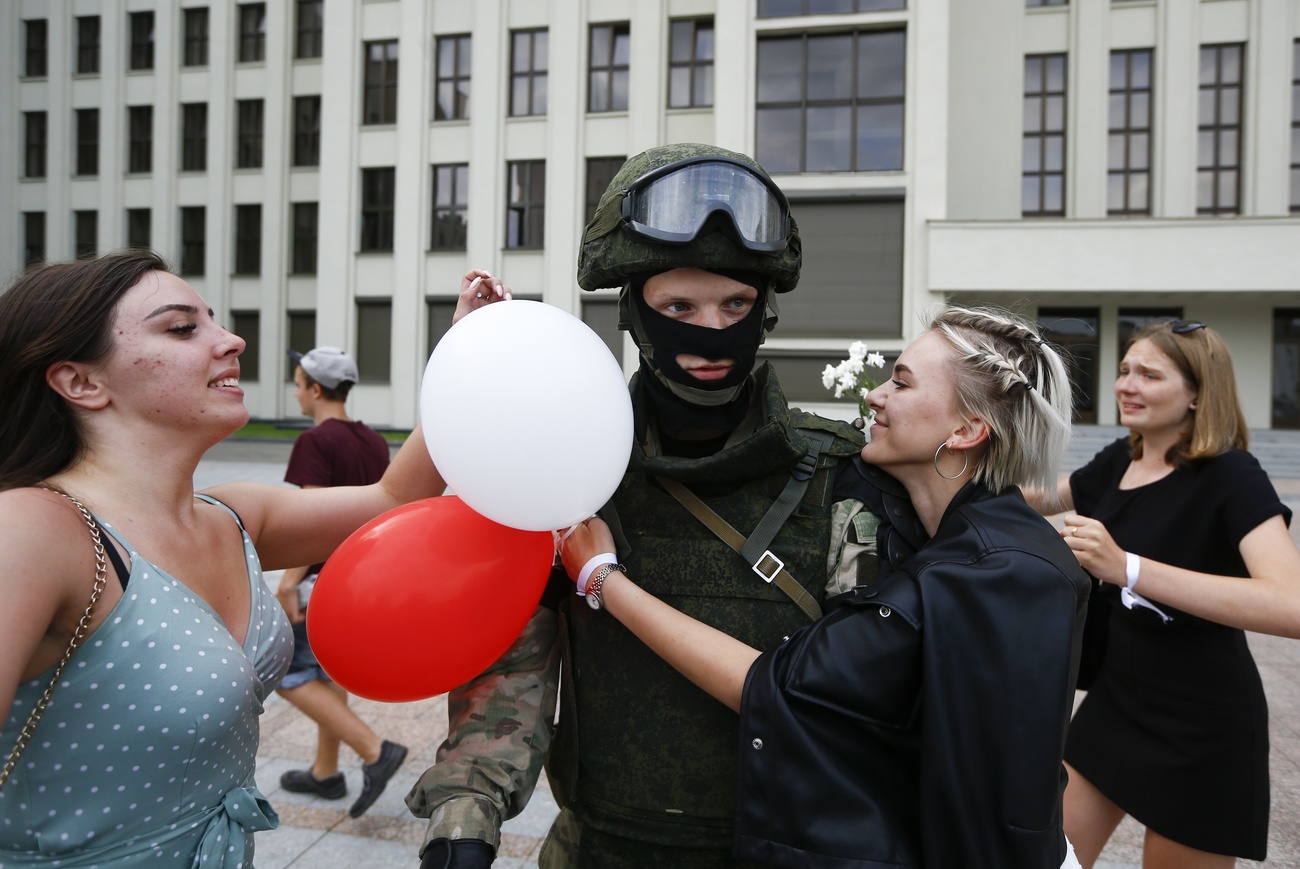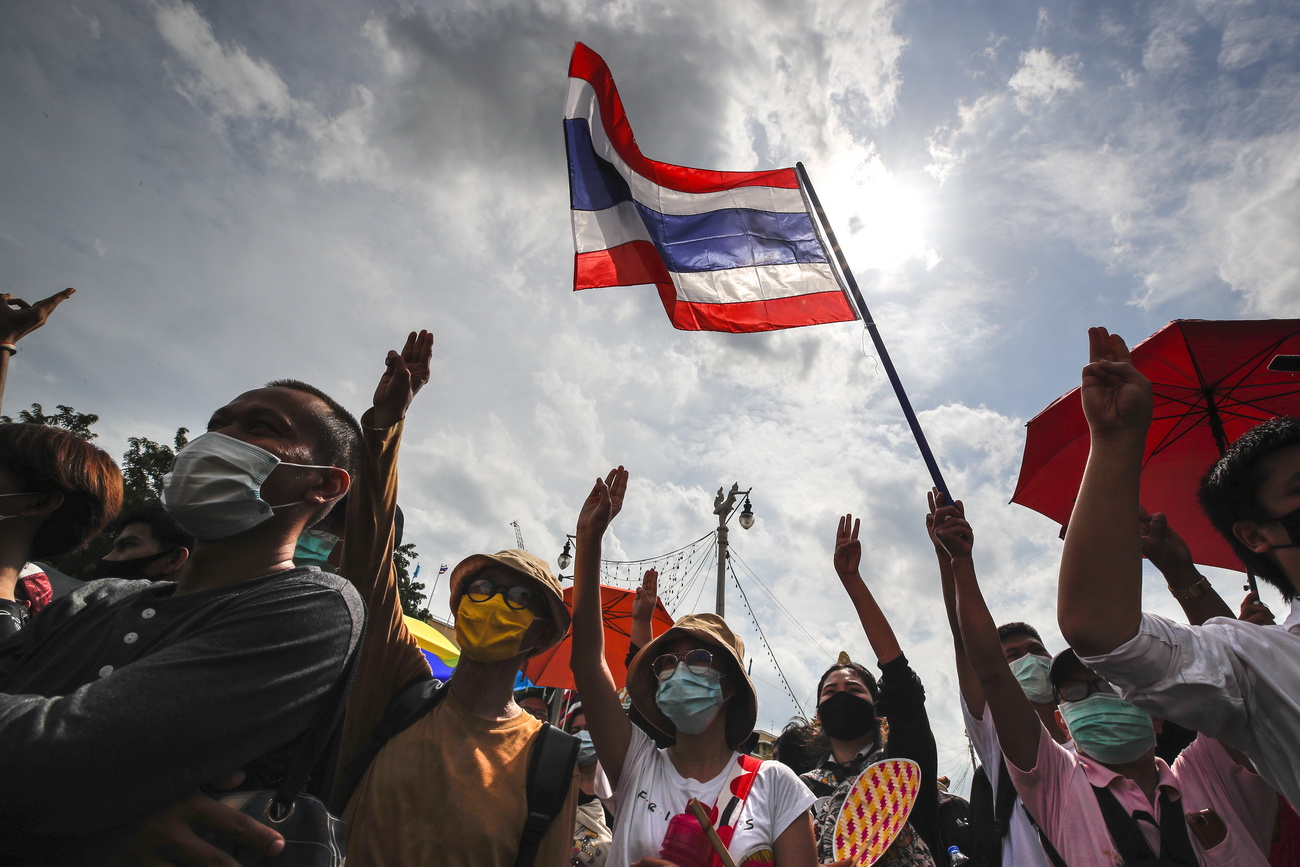What’s new in Swiss and international democracy

Reports and images coming out of Minsk and other cities in Belarus last week have been telling.
On one side stood the “big winner” of the August 9 presidential election – the commission gave incumbent ruler Alexander Lukashenko more than 80% of the vote – looking slightly confused, presiding over a crowd of his supporters.
On the other side stood the hundreds of thousands of Belarus citizens peacefully asking for change and free elections, gathering for the biggest pro-democracy demonstrations in the history of the country, which has been run by the former Soviet tank officer since 1994.
Lukashenko, who has proudly declared himself a “dictator”, was also the only member of the Belarus Soviet assembly who back in 1991 supported the military coup against then president Mikhail Gorbachev.
Over the course of a quarter of a century, using spurious referendums and elections and a repressive state apparatus, Lukashenko has managed to navigate every geopolitical shift in Europe. Throughout this time, political opponents and independent journalists had to be careful to avoid the regime’s enforcers.
I myself as a journalist have visited the country twice in recent years and in both cases was arrested and placed in a cell before being expelled from the country. But last week, after yet another manipulated election, Lukashenko’s dreaded Omon special units went into overdrive: arresting, beating and torturing thousands of mainly young people on the streets – among them foreigners like the 21-year-old Swiss wrestler Tanguy Darbellay.
It took a direct intervention by Swiss Foreign Minister Ignazio Cassis to secure Darbellay’s release, which was celebrated at the newly opened Swiss Embassy in Minsk. But will this office soon have another role than dealing with a dictatorial regime?
At the time of writing, it looks somewhat likely as the people of Belarus seem keen to stand up to their ruler. But though some Belarus representatives – including a former diplomat based in Bern – have also criticised the crackdown, Lukashenko has since phoned Russian President Vladimir Putin to ask for military support.
The next hours and days will be critical in this high noon for democracy, which is not only happening in Europe right now, but also in many other parts of the world.
Thai protests

In the biggest protests since the 2014 military coup, Thai students have also gathered at Bangkok’s normally protected democracy monument (I reported from it a few years ago).
In a historic declaration, the students have demanded a comprehensive reform of the monarchy, an institution which has long been off-limits when it comes to criticism and accountability. The protest come four decades after another student movement targeting then-Crown Prince Vajiralongkorn – today’s king – ended in a massacre when police opened fire on students inside Thammasat University, killing dozens, lynching and battering bodies.
But now, as the pandemic has essentially frozen all incoming tourism to Thailand and with King Vajiralongkorn having fled to a hotel in Germany, the government in Bangkok is losing support daily.
In Hongkong, meanwhile, the ongoing attack by the Communist government in Beijing on the city’s special freedoms has provoked wide-ranging local and international criticism – including from the Swiss capital Bern.
And in the US, where the main parties will nominate their presidential candidates this and next week, the current White House resident has openly declared he wants to weaken the nation’s postal services in an attempt to undermine the upcoming November 3 elections.
In the country with the most Covid-19 infections and victims, where many schools are still closed and unemployment has reached new levels, this controversy underlines what we can expect this autumn – another testing time for democracy.
Corona campaigning
In Switzerland, politics and direct democracy are picking up again after the spring lockdown and the summer holidays. Next month voters will make major decisions on five important issues; and here we offer an insight into how the pandemic has influenced to varying degrees the campaigning around these topics, as well as voters’ attitudes.
There’s a sense of déjà vu around some of the votes: one of the issues is about scrapping a labour and free movement agreement with the European Union – not the first time the Swiss will make a decision this. Nor is it the first time when it comes to a referendum on spending CHF6 billion on new military fighter jets.
What will be clear however – and nobody will call this a democratic problem – is that most voters will send in their votes by post. Up to 90% of votes in some regions are cast this way, something which the pandemic (and social distancing rules) is likely to encourage even more. Food for thought for our American readers…
Thanks for reading, and let us know if there’s any other democracy topics you’d like us to report on. Get in touch with our correspondents Bruno Kaufmann or Domhnall O’Sullivan.

In compliance with the JTI standards
More: SWI swissinfo.ch certified by the Journalism Trust Initiative

You can find an overview of ongoing debates with our journalists here. Please join us!
If you want to start a conversation about a topic raised in this article or want to report factual errors, email us at english@swissinfo.ch.